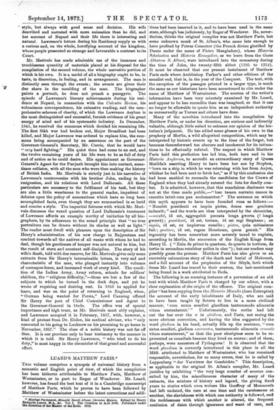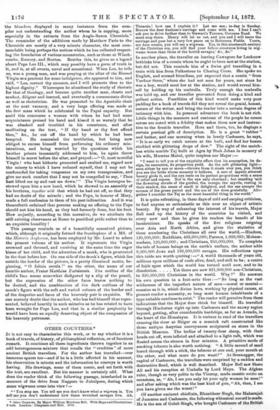LUARD'S MATTHEW PARIS.* THIS volume comprises a synopsis of universal
history from a monastic and English point of view, of which the compilation has been hitherto attributable to Matthew Paris, Matthew of Westminster, or in part to Roger of Wendover. Mr. Luard, however, has found the best text of it in a Cambridge manuscript of Matthew Paris, which he proves to have been followed by Matthew of Westminster before the latest corrections and addi-
* Matthmi Parisiensis, Monathi Sandi Albani, Chrontica Mojora. Edited by Henry Richards Luard, MA, Ste. Vol. I. The Creation to A.D. 1066. Published under the direction of the Muster of the Rolls. 1572. Cons had been inserted in it, and to have been used in the same state, although less judiciously, by Roger of Wendover. He, never- theless, thinks the original compiler was not Matthew Paris, but some unknown monk of St. Alban's, who came late enough to have profited by Petrus Comestor (the French divine glorified by Dante under the name of Pietro Iktangiadore), whose Historia Scholastica and Historia Evangelica, as we learn from the Gesta Abbatum S. Albani, were introduced into the monastery during the time of John, the twenty-fifth abbot (1195 to 1214)- It must be observed that our present instalment of Matthew Paris ends where Archbishop Parker's and other editions of the annalist end, that is, in the year of the Conquest. The text, with the exception of the passages printed in a larger type, is much the same as our historians have been accustomed to cite under the name of Matthew of Westminster. The sources of the writer's information have been very minutely examined by Mr. Luard, and appear to be less recondite than was imagined, so that it can no longer be allowable to quote him as an independent authority as unreservedly as Turner and others have done.
Many of the novelties introduced into the compilation by Matthew Paris, or under his direction, are curious and indirectly valuable, although little suited to enhance our opinion of the his- torian's judgment. He has added some glosses of his own to the prophecy of Merlin, a wild allegorical composition, which may be interpreted by historic events up to the time of the forger, but becomes thenceforward too obscure and incoherent for its intima- tions to be effectually refuted. The respect in which Matthew Paris held this prediction has led him, both here and in hia Historia Anglorom, to accredit an extraordinary story of Queen Matilda's asserting Henry to have been her son by Stephen, "born on a ship in which he was returning with her from Anjou, whither he had been sent to fetch her," as if by this confession she had been enabled to reconcile the candidates for the Crown of England when they had already entered the lists for deadly com- bat. It is admitted, however, that this scandalous disclosure was not at the time made public,—" base tamen narratio omnes in exercitu latuit cum pax acclamaretur." The sentence on which this myth appears to have been founded runs as follows :— " Nocebit possidenti ex impiis pietas, donee sese genitore induerit; " and the words are thus interpreted by the chronicler, —nocebit, id eat, aggregabit peccata longs gwerra (? long& gwerra) ; possidenti, id eat, terram, id eat regi Stephano ; ex impiis, id est, ex impiorum consilio ; pietas, quia mitisaimus fuit ; genitore, id eat, regem Henricum, quem genuit." His ingenuity has been somewhat more severely taxed to explain, according to Merlin, the succession of the English Kings from Henry II. ( " Exin de primo in quartum, de quarto in tertium, de tertio in secundum rotabitur potter in oleo ") ; -but our readers may possibly gums the process. Matthew Paris has also given us an execrably calumnious story of the death and burial of Mahomet, and a full account of the prophecies of the Sibyls, both which items Mr. Luard has traced to their sources, the last-mentioned being found in a work attributed to Bede.
The following is an amusing instance of a perversion of an old text with which Matthew Paris is charged by our editor, with a clear explanation of the origin of the offence. The original com- piler "has been copying from the Historia Miscella (here Eutropius) the account of the early inhabitants of Italy, who are said to have been taught by Saturn to live in a more civilized manner, 'cum antea semiferi glandium tantummodo alimentis vitam sustentarent.' " Unfortunately, the scribe had left out the bar over the a in gladiola, and Paris, not seeing the more obvious correction, and having the idea suggested by the word gladiola in his head, actually fills up the sentence, " cutn antea semiferi, gladium exercentes, tantummodo alimentis cruentis vitam sustentarent," so that the poor aborigines seem to be re- presented as cannibals because they lived on acorns ; and of them, perhaps, were ancestors of Pythagoras ! It is observed that the word glandium is correctly introduced in this place in all the MSS. attributed to Matthew of Westminster, who has remained responsible, nevertheless, for so many errors, that he is called by Lappenberg "der Verwirrer der Geschichte." This description, as applicable to the original St. Alban's compiler, Mr. Dead justifies by exhibiting "the very large number of sources con- sulted by him, the miscellaneous character of many of the extracts, the mixture of history and legend, the giving fixed years to stories which even writers like Geoffrey of Monmouth had left undated, the care at one time and the carelessness at another, the slavishness with which one authority is followed, and the recklessness with which another is altered, the frequent confusion of dates through ignorance and want of care, and the blunders displayed in many instances from the com- piler not understanding the author whom he is copying, more especially in the extracts from the Anglo-Saxon Chronicle." The remainder of the additions made by Matthew Paris to the Chronicle are mostly of a very minute character, the most com- mendable being perhaps the notices which he has collected respect- ing the foundation of various monasteries, such as those at Winch- combe, Ramsey, and Burton. Besides this, he gives us a legend about Pope Leo III.; which may possibly have a germ of truth in it, and is, at all events, novel and sensational. When Leo, he tells us, was a young man, and was praying at the altar of the Blessed Virgin as a penitent for some indulgence, she appeared to him, and said, "Leo, correct tby excesses, and I will promote thee to the highest dignity." Whereupon he abandoned the study of rhetoric for that of theology, and became quite another man, chaste and modest, diligent and learned, and eventually a consummate divine as well as rhetorician. He was promoted to the Apostolic chair at the next vacancy, and a very large offering was made at the first mass which he celebrated in the Papal capacity. But amid this concourse a woman with whom he had had some acquaintance preised his hand and kissed it so warmly that he was abashed and troubled in his conscience, and after meditating on the text, "If thy hand or thy foot offend thee," &c., he cut off the hand by which he had been tempted. He concealed the mutilation, but being now obliged to excuse himself from performing his ordinary min- istrations, and being worried by the questions which his brother priests incessantly addressed to him, he again threw himself in secret before the altar, and prayed:—" 0, most merciful Virgin ! who bast hitherto promoted and exalted me, regard now the misery to which I have reduced myself, that I may not be confounded for taking vengeance on my own transgression, and give me such comfort that I may not be compelled to say, Thou bast lifted me up and cast me down.'" The Virgin hereupon be- stowed upon him a new band, which he showed to an assembly of his brethren, together with that which he bad cut off, so that they bad no doubt of the miracle ; and the Pope, in honour of Mary, made a full confession to them of his past infirmities. And it was thenceforth ordained that persons making an offering to the Pope should not kiss his hand, as they had formerly done, but his foot. How unjustly, according to this narrative, do we attribute the still existing observance at Rome to pontifical pride rather than to an exquisite humility !
This passage reminds us of a beautifully conceived picture, which, although it originally formed the frontispiece of a MS. of the Historia Anglorum, has been employed by Mr. Luard to adorn the present volume of his author. It • represents the Virgin crowned and throned, and receiving at the same time the eager kisses of her child, and the adoration of a monk, who is prostrated in the dust before her. On one side of the tbonk's figure, which lies outside the border of the picture, is a pretty illumined motto, be- ginning, "0 felicia oscula !" on the other, the name of our humble author, Frater Matthias Parisiensis. The outline of the child's face seems somewhat disfigured by a slip of the pencil, but the expression of the other faces leaves nothing to be desired, and the combination of the dark outlines of the monk's figure with the soft and varied colours of the border and of the draperies and faces of the heavenly pair is exquisite. We can scarcely doubt that the author, who has had himself thus repre- sented, believed heartily in such miracles as he has related to have been wrought for Pope Leo, and that in a similar perplexity he would have been an equally deserving object of the compassion of his heavenly patroness.



































 Previous page
Previous page